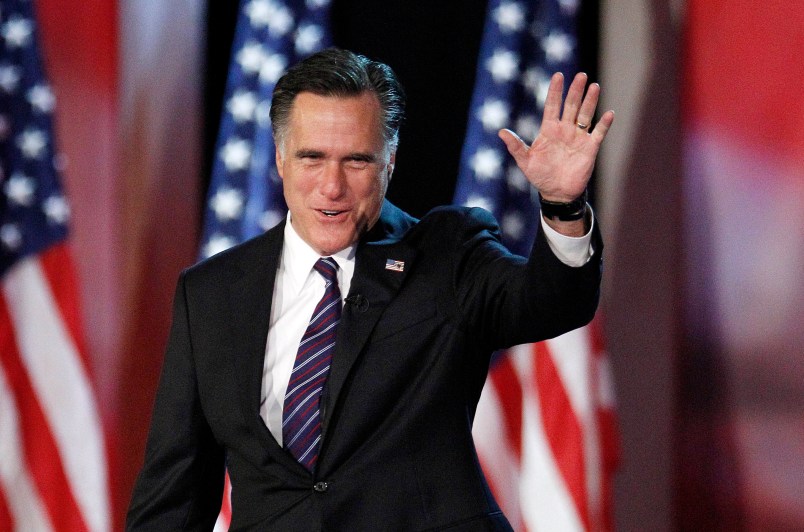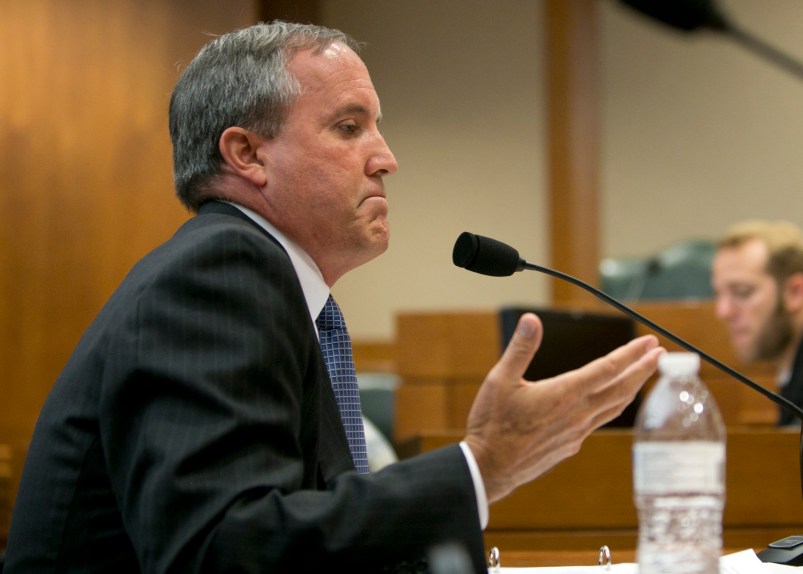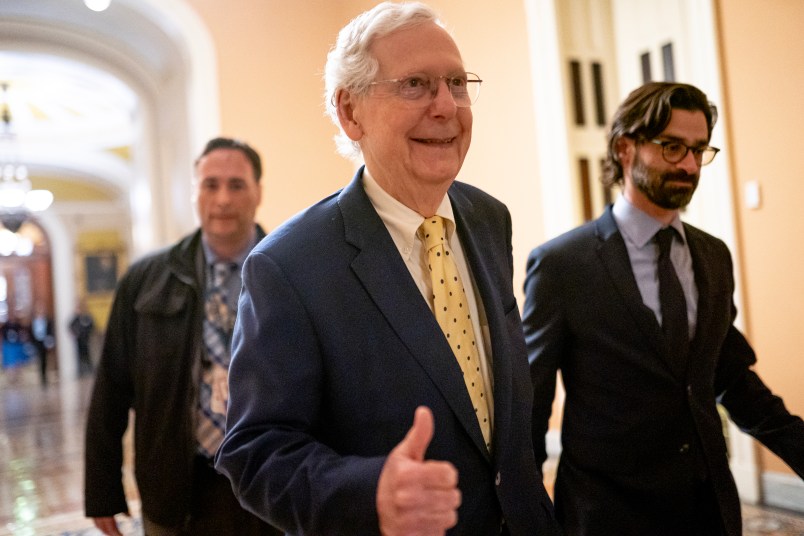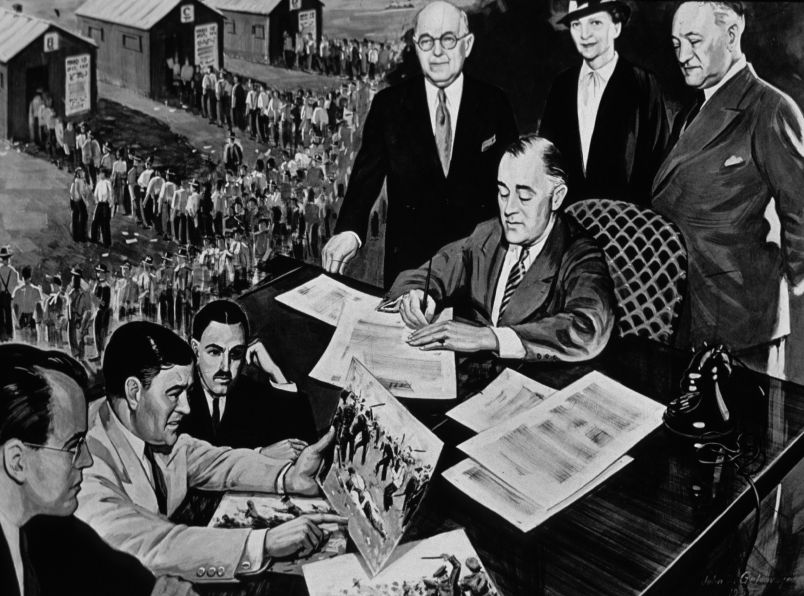The prospect of a third consecutive presidential campaign by Mitt Romney suddenly became very real over the last few days, after the former governor first told a group of donors he still wanted to be president, and then spent a weekend burning up the phone lines tracking down former supporters and staffers to ask them to help, or at least avoiding joining any rival team. It’s theoretically possible it’s a head fake or trial balloon prompted by Jeb Bush’s equally surprising recent plunge into proto-candidate status, which by all accounts threatens the donor base of any Romney run. But there’s a frantic and very personal quality to Romney’s activities the last few days that make them appear less cool and calculated than, say, a Bain raid on a troubled company.
Thus I’ll leave the skepticism about Romney’s intentions to Jonathan Chait, who thinks Mitt’s too smart to believe he actually has a chance in 2016, and instead take a look at those chances.
From the point of view of history, Chait’s got a point. The last defeated major-party presidential nominee who sought the White House in the very next cycle was Hubert Humphrey in 1972. The last to win a second consecutive nomination after losing the general election was Adlai Stevenson in 1956; the last comparable Republican was Thomas Dewey in 1948. And the last to win the presidency immediately after losing a general election was Grover Cleveland in 1892, but that’s distinguishable because he had been elected president eight years earlier. So you have to go back to William Henry Harrison in 1840 to find someone who lost a general election immediately before ever winning one, and even that precedent in hinky since the Whigs in 1836 ran four regional candidates (Andrew Jackson in 1828 was a bit more on point, if you think losing a presidential election in the U.S. House doesn’t spoil the comparison).
So you’d have to ask what it is about Mitt Romney that would equip him to set an entirely new precedent in U.S. political history. He’s not the clear leader of any party faction. He did not inspire deep devotion among the GOP’s conservative rank-and-file. And he and his people did not fare terribly well in the brief post-election ruminations among Republicans, who generally felt he made a lot of unforced errors, especially the famous “47 percent” comments that still haunt the party. Moreover, to the extent he stands for any point of view, it is certainly represented somewhere in the vast ranks of Republicans still considering a 2016 race. As Chait points out, Romney’s most loyal minion in the chattering classes during the 2012 cycle, Washington Post blogger Jennifer Rubin, seems embarrassed by the very idea of Mitt ‘16.
Still, Mitt has led the field in the few 2016 polls that have tested him—including a survey of Iowa Republicans released today—and he has enough personal wealth to float a campaign if he wishes to cheat his heirs. He is also benefiting from international events since the 2016 election (particularly his claim, mocked at the time, that Russia would remain America’s chief geopolitical rival) which in conservative eyes have made him a “prophet.” He’s also benefiting from the psychological effects of the 2014 midterms, which have convinced a lot of Republicans they can’t lose in 2016 unless they wind up with a Wacko-Bird nominee. So while the odds of Mitt’s ultimate nomination may be low, his campaign sure has the potential to mess with the contest’s dynamics, and ruin things for others.
The proto-candidates Most Likely To Be Hurt By A Romney Redux must begin with Jeb Bush, who now has to deal with a direct rival for major Establishment donors, and an unfriendly opponent who is already talking about hammering him for ideological heresies, especially on immigration policy. Bush could ask Rick Perry what that is like; it was Team Mitt that turned Perry’s expression of compassion for Dreamers from a self-inflicted flesh wound into a fatal geyser of political lifeblood. More generally, all rivals should remind themselves that the image Romney eventually developed as a sort of bumbling, genial grandfather was preceded by the vicious primary candidate who attacked Newt Gingrich for working for that minority-homeowner-coddling Freddie Mac and assaulted Rick Santorum as a big-spending union stooge. He will have no compunctions about taking opponents down with smears and slurs. I figure he’s already got thick oppo-research files on Santorum and Perry from 2012 and Huckabee from 2008. They’ll go to good use.
Mean Mitt could be particularly bad news for candidates who are positioning themselves as acceptable both to conservative activists and to the Establishment, thus getting directly in Romney’s way: Scott Walker, Mike Pence, Bobby Jindal, and even the new “mature” Rick Perry. You think a Romney 2016 campaign would hesitate for a moment in running an ad about the exorcism in which Jindal participated while he was at Oxford? Only if focus groups don’t like it.
Viciousness aside, the presence of both Romney and Bush in the campaign will screw up every other candidate’s fundraising budgets, not only by taking dollars off the table but by raising the price of a candidacy. If you are, say, John Kasich, exactly how much are you willing to raise to get the opportunity to be attacked every day for accepting Obama’s Medicaid expansion?
No, Mitt Romney may not be the presidential nominee of his party in 2016. But a contest that already had every prospect of becoming a third straight GOP demolition derby may have just registered an entry certain to heighten the damage.
Ed Kilgore is the principal blogger for Washington Monthly’s Political Animal blog, Managing Editor of The Democratic Strategist, and a Senior Fellow at theProgressive Policy Institute. Earlier he worked for three governors and a U.S. Senator. He can be followed on Twitter at @ed_kilgore.









